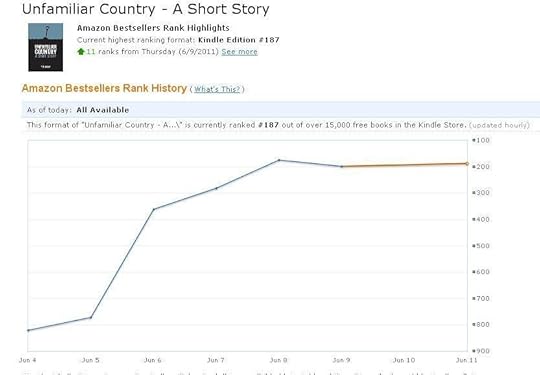T.S. Sharp's Blog, page 11
August 1, 2011
'Unfamiliar Country' featured on Books Monthly website
Thanks to Paul Norman, Unfamiliar Country is currently featured on the Books Monthly website.
http://www.booksmonthly.co.uk/kindle.html
Books Monthly is a review site covering the new releases and I'm grateful for having mine mentioned here. It's not strictly a review, more of an advert for the short story, but he does have the following praise;
"Concise and atmospheric – a real sense of stomach-churning unease…" (Books Monthly)
Thanks Paul 








July 29, 2011
Stephen Leather on writing ebooks…
I heard an interesting interview with bestselling crime writer Stephen Leather recently about the nature of self publishing and ebooks in general.
The interview can be heard here, on BBC Radio 4′s You & Yours programme;
http://www.bbc.co.uk/programmes/b012krrc#p00j7y3t
He raises some interesting points about the way that the growth of ebooks is starting to change the style of writing, that writers are adapting their style to meet the new experience of reading via portable electronic devices, such as the Kindle.
He suggests that the Kindle reading experience lends itself to shorter books, with shorter paragraphs and shorter, sharper sentences, suggesting people read quicker on Kindle than they do with traditional books.
Ultimately this poses the question – is (e)reading changing writing?
Self publishing writers, such as myself, who are looking to the Kindle as the primary platform for their work might want to think about style and word count when writing novels. Traditionally published books are being released on Kindle in their original state obviously, but new writers seem to be adapting their style to suit the Kindle, with more plot driven work, at least according to the views given in the interview.
The discussion moves on to the pros and cons of Kindle vs traditional books, most of which has been discussed ad infinitum, but it does refer to ebooks as being the online slushpile, a virtual storeroom for all the books that haven't made their way to real world bookshelves, for whatever reason.
When not sounding a teensy bit smug about his own Kindle success, Leather does make some good points about writing and its relationship with ebooks which I hadn't considered before.
Any thoughts?








July 6, 2011
Amazon Ownage.
It occurred to me the other day that Amazon now owns me. They've become like the big supermarket chains – controlling every aspect of your life.
Amazon provide me with all my forms of entertainment, all my books/DVDs/CDs/MP3s/video games – they all come from amazon. They're most often my first port of call when sourcing birthday presents, too.
I sell the odd second-hand book through the Marketplace section, which has me queuing up in Post Offices to get them to the customer.
And now, courtesy of Kindle, I am starting to use them as way of creating a source of revenue by selling copies of my short story 'Unfamiliar Country'. This in itself is another source of obsession. Curse those 'Amazon Bestseller Rank' numbers displayed under the Product Details section! As a Kindle author, you get access to 'Author Central' and the 'KDP Bookshelf' where you can check the stats for your products. Neat graphs and data which are all updated hourly means I'm constantly 'just checking' for some evidence of overnight success and recognition. Thanks a bunch, Amazon.
While writing this, there could have been a whole slew of downloads and rankings climbing, so I better go and check…








June 22, 2011
Research & Tangents
Ever considered the strange places researching your writing has taken you? If you think about all the little bits of research, however minor, you've had to do to check out the details or dates of something you're not familiar with, you'll probably have looked into a wide variety of subjects. Looked at in a list they probably won't make any sense.
If you're a writer of historical fiction, your research will most probably all fall into the same areas and historical era. But if you're a writer of contemporary fiction, consider what you've had to read up on or look up on the net.
Most of my research has been Google based, as lazy as that is, with the odd bit of asking questions on online forums. Here are some of the things I've had to investigate;
Prison visitation routines and times
Tenerife bus services
How to prepare and fire a Browning HighPower handgun
Searching through restaurant menus to find the 'perfect' meal for a scene
Lithuanian European Union accession
Jail terms for drug trafficking
Often the research can take you on long and unexpected tangental journeys, providing you with all sorts of new angles and themes. What kind of things have you had to research in your writing? Are they things that are totally outside your sphere of reference, that you never thought you'd be finding out about?








June 11, 2011
'Unfamiliar Country' now at #5 in Amazon free short stories ranking
My short story, Unfamiliar Country, at time of writing is at number 5 on Amazon's free short stories bestseller list. It was set to free sometime last weekend and has downloaded over 220 copies in the last week alone, with a handful of US downloads/sales too.
It is currently 187th out of the 15,000 free books on Amazon, an achievement I didn't think possible when I listed it. New work is being uploaded to Amazon's Kindle platform all the time, so the danger of being lost among the piles of books is a very real one.
When viewed in category view on Amazon, it's listed alongside Michael Faber's Crimson Petal Stories in the paid section. His book was recently made into a fantastic BBC adaptation, so seeing my work alongside his is very pleasing, albeit it in separate categories – Paid and Free etc – but I still like to allow myself this little indulgence!
While making the story available for free won't make any money in the short term, it's gratifying to think that people are reading it, which is ultimately what a writer wants from making his or work widely available.
As to why it has suddenly become so popular as a free download is difficult to say, but I suspect a decent front cover helps enormously. The saying 'don't judge a book by its cover' no doubt has some resonance, but I still believe the cover of a book makes a massive difference. The cover for Unfamiliar Country was designed by a good friend of mine who is a graphic designer, so I am grateful to him for giving the book a professional first impression, regardless of the content 
I'm yet to receive any reader reviews on it since it went to free, and maybe people don't readily do reviews for short stories, but it would interesting to see what some of those 220+ people thought of it.
In the meantime, if anyone knows what 35% of zero is, I'd like to know.
Unfamiliar Country – UK
Unfamiliar Country – US








June 2, 2011
Wine, women and wondering…
This is an excerpt from Seven Seconds. I was doing some editing on it and wanted to know what this looks like 'out there'. Here, the protagonist and antagonist discuss the strength of feelings they have or had for the same woman.
~
We round the meal off with another bottle of red wine which we take out onto the wooden decking. Most of the other diners have either finished and left or are casually picking at tapas on long tables. Out across the valley all the shapes of the landscape are the same monochrome shade in the moonless night, leaving only the sparse lights of houses and cars to populate the darkness.
"So how are you and Kat?"
"We're good," I reply, but I know he's not asking about our general wellbeing.
"Maybe in another lifetime I could have made a proper relationship out of our situation, but in reality she's too good for me." I say nothing, but suck red wine through my teeth. It's so delicate I can almost feel it osmosing through the pores in my mouth.
"Whereas you, Steve, you might just be perfect for her. Someone with patience and consideration. I was always too busy talking about myself or generally not showing any interest. That's why I told you to tell her what you felt about her, because you deserve that, you both do." Rob's sudden candidness about his near miss of a relationship with Kat is embarrassing in its earnestness.
"Did you love her?" I ask him.
"No I don't think so. But anyway, it's like my paramedic job, gone forever because of the decisions I made on the spur of the moment."
Rob's language veers dangerously close to that of regret, a sentiment I have not previously witnessed from him.
"Do you love her?" Rob asks me, turning his head from looking out into the darkness to face me.
"I don't know." I genuinely don't.
"Do you think about her all the time? If she never called again would you be upset? Is there anyone else you'd rather be with than her?" His questions are fired at me like a police interrogation. "Because if the answer is yes to all of those questions, then I think you do."
"Well the answers are yes, but I'm still not sure about the love thing," I tell him, embarrassed and uncertain in equal measure.








May 18, 2011
Historical novel writing – a saga too far?
They say everyone has a novel in them. But I say every writer has a historical novel in them too.
I have a theory that all writers harbour a desire to write a historical novel at some point. No matter what genre they currently write in, they long to write an epic historical novel set in the particular era they're interested in. I've heard several writers of contemporary fiction fantasise about one day penning a story set in the depths of the past. I think we all have a time and era that we're drawn to. For me it's vikings and the early medieval period. For others it's world war two, Victorian England or colonial America. With thousands of years of human history behind us, there's plenty to choose from.
The research puts me off. Or rather the immersion into the research puts me off. Once I've sourced the historical material and been to the museums and spent ages on the web, the story will fade further and further into the ether. The other problem for me is that I read a lot of historical fiction, so I have both the urge to try it myself and to avoid it as I won't be able to do it justice like those writers. I'm terrified of the fine balancing act a historical writer has to perform between compelling story telling and historical exposition. I fear I'd go off on massive and unnecessary tangents about how the word viking is actually a verb meaning to go 'vik-ing', ie raiding, and forget all about the story of Ragnar and his saga to recapture his lover from the evil Godfrith.
If anyone out there has written some historical fiction I'd be interested to find out how you got on. Did the research turn into an unkillable monster? Is there a key to keeping the story telling and the history lessons in equilibrium? Did you do all the research, then all the writing, or the writing first and then went back and changed the historical parts? Answers on some parchment paper please…








April 28, 2011
Look at me, I'm doing it….

I find that writing can be like learning to ride a bike for the first time. I say this because I am one of those writers who writes infrequently. I am both lazy and suffer from writers block (OK, I'm mostly lazy and unmotivated) but when I do actually start writing something, I feel like saying – 'wow – look at me, I am actually writing'. It's like learning to ride a bike – you decide to give it a go, start peddling and all of a sudden you realise you're halfway down the street and you're off!
Is this just me or does anyone else have this sensation when they're in the flow of creating writing? Maybe I just notice it because I write in stop-start fits. Maybe if I wrote more frequently I'd lose this feeling, but at least I'd be more productive in terms of word count.
To stretch the metaphor even further, riding a bike and writing (but not at the same time, that's stupid) can both involve falling off and not getting back on again for some time. But both are easily resumed, it's just a matter of application. I must remember this. But for now 'look at me, I'm writing!'








April 15, 2011
Kindle cold-calling?
Fellow writers with work on Amazon Kindle, have you ever seen someone reading a Kindle and fought the urge to go over and suggest they download your book?
I had this happen to me the other day, and was wondering if anyone else has experienced it before. You see people using Kindles on public transport, cafes and waiting rooms, and each one of these people is a potential customer and reader of your work. For the record, I didn't go over and interrupt the reader as it would be embarassing and basically the worst form of cold calling. I did however fantasise about different ways of doing it. How about combining the intrusive banter with a business card with your book details on? That way they could check out your work later and they'd definitely remember your name and book title.
Another approach would be to engage in friendly conversation about the Kindle in general, and then drop into conversation that you have a book on the format that they might be interested in. Certainly steaming straight in with the details and asking them to buy it would be a bit much.
These approaches could also be employed for readers of traditional books (you know the kind, those paper things that only contain one story by one writer) but I doubt it would work as well. You'd already know what kind of books they read by the type of book they had in their hands, and the likelihood is it wouldn't be in a similar genre to your own.
The biggest pitfall would be to piss the reader off so much that they actively refuse to look at your work and tell all their friends what a massive tool you are.
I'd love to know if anyone has ever tried this, or at least the milder variations of asking a stranger to buy your book, simply by virtue of the fact they have a Kindle reader in their hands.
Tried it? How did you do it? Did it work?








April 12, 2011
Writing & the pub.
Scenes set in a pub seem to be great locations for writers to throw together characters and weave stories and dialogue. I don't think I've ever written anything that doesn't have key scenes set in a pub. As for actually writing in a pub, I've never done that, but maybe I should. It would have to be a particular type of pub. Not one that has a massive plasma screen for sports or a carvery section and hordes of kids running amok. Nor could it have an overly chatty but well-meaning publican – 'Oh what you writing? A novel? Ooooh! What's it about? When it's going to be published?' Maybe that's why I've never tried it. More research needed.
Do other writers recommend writing in pubs or bars? Laptop or pad and pen? Is booze recommended?
Unfamiliar Country only has one pub scene and it's a pivotal moment of the short story. Here's the first part of it.
~
The village the farmer had mentioned was nothing more than a crossroads with a few cottages and a pub. Boyd headed straight for the Butcher's Arms, glancing across to the car park. He saw it was almost totally empty and then stepped through the heavy front door into the lounge.
The room was empty, without any bar staff. He walked to one end of the bar and glanced down the side of the room. No one was sitting at any of the tables. He heard footsteps coming from somewhere behind the bar and out came a woman in her thirties, casually dressed and slightly overweight. She smiled at Boyd and placed her hands on the counter top.
"What can I get you?" She asked, her accent thick and friendly like Hughes' had been.
Boyd glanced at the pumps and opted for a beer from a local brewery.
"A pint of one of those please, and some ready salted crisps."
"Certainly."
Boyd noticed a rack on the bar which held newspapers. He selected a broadsheet, mostly because it offered more reading material than the tabloids.
"Three pounds and thirty pence. I'll just go and get your crisps," the woman said, placing the still-settling pint in front of Boyd, then moved to the other end of the bar.
Boyd pulled a selection of loose change from his pocket. Amongst the coins was the brass shell casing he had picked up from the forest floor a couple of days earlier. Boyd plucked it out and shoved it back in his pocket as the woman returned with the crisps. He handed her the correct amount and smiled. She smiled back and then started wiping the moisture from the bar where his freshly pulled pint had left its mark.
He picked up his beer and crisps and turned to cross the room and sit in the corner. As he looked up from his purchases he saw that the seat he was about to take up was occupied. Boyd stopped in his tracks. Sitting in the corner of the room was a man staring straight at him. His clothes were dirty and he was totally motionless. Boyd was rooted to the spot, staring back at the man.
"Are you all right, love?" The barmaid asked him, obviously confused by his sudden inertia.
"Er, yeah, fine," Boyd stammered. Still the man sat there, staring at him. The woman didn't seem to react to the strange figure.













